Side Quest: Eco
Even in the virtual world, saving the rainforest is not straight forward
For the last couple of weeks, I’ve been playing a game called Eco. The premise is simple – A meteor will crash into your planet in 30 days. Starting from the stone-age, build up a civilization capable of blasting the meteor to pieces and thus saving the planet. However, you need to do it without destroying the natural environment in the process.
The catch is it’s an online multiplayer game. You need to cooperate with other players and manage shared resources to make progress both towards your own personal goals and the overall save-the-planet mission. So the game becomes an interesting social experiment, and one highly relevant to the times we live in.
It’s a topic I’ve been thinking about a lot recently, so I was very curious to see what things could be learned to maybe help in the real world. And also see how my profession (making video games) could contribute to both people’s understanding, and motivating action.
An Education
I did not jump into a multiplayer world straight away though. Instead, after poking around on my own private world for a few days, I had a good grasp of how to play the game, and also some ideas I wanted to try with other people. In particular, certain activities in the game required “skills” such as tailoring to make clothes that give the wearer bonuses. Or masonry to make better building blocks for homes. These skills needed to be learned (unlocked) by players by reading “book” items, and these books in turn needed to be written (crafted) by someone. All of which required a lot of effort.
It seemed therefore that game placed a high value on education, and so a library would be an excellent resource for any Eco world. Players would in theory be free to get on with their chosen roles in the game without having to worry about lacking the necessary skills, nor the onerous task of acquiring the books needed to unlock those skills.
Furthermore it would be an interesting social experiment, to see if people returned the books once they had used them. Especially since the game rules would not necessarily punish any player who didn’t.
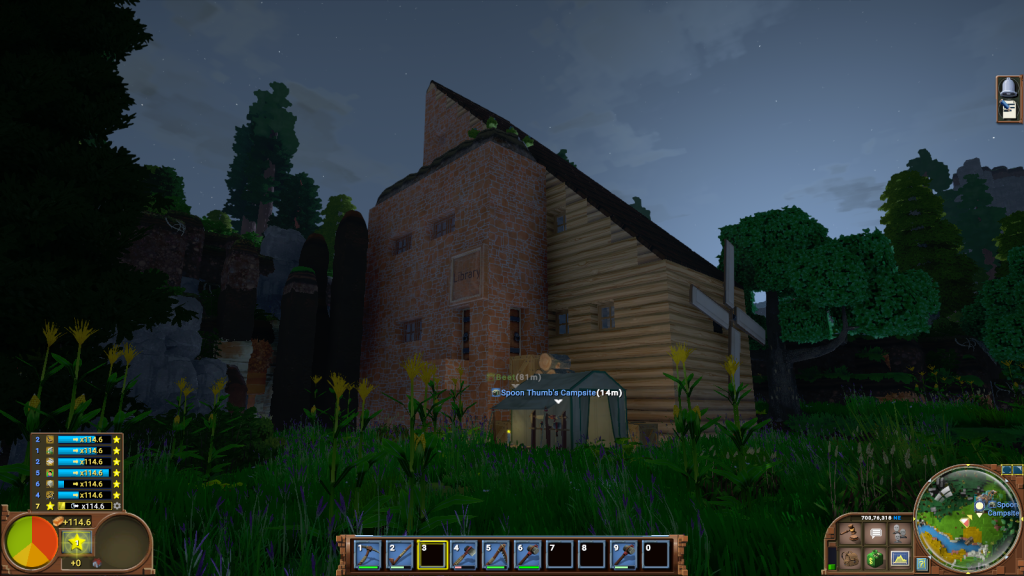
Day 1
With my plan ready, I found an official game server that had just started a new world, and jumped in on day 1. I picked a plot of land nearby where a group of other players had started building their houses and setting up shops to trade items with each other. After some hard graft mining for stone and harvesting plants and food from nearby wild meadows, I had constructed a modest building to be my in-game workshop, house, and hopefully soon the town library too.
Unfortunately, I rapidly discovered things were different on the official servers versus the private world I had practiced on. For one thing, it was much much harder to level up, and many of the books I hoped to produce for other players I would not be able to create for some days yet.
Moreover, the learning of skills from books was a bit more complex than I realised: Players use the books to produce an intermediate item called a “skill scroll.” It is these skill scrolls, which when consumed, actually give the player the skills. As I talked to other players and looked around the world to see what everyone else had been doing while I was building my house, I discovered someone else had already had the same ideas as me about the value of skills. Except rather than loaning out books library style, they were selling the intermediate skill scrolls, albeit at very low prices. Furthermore, they clearly knew the game much better than me, as they had already produced a far wider range of books and skill scrolls than I was likely to be able to offer any time soon.
Continuing with my library plan would sadly undercut this other player’s effort while not really adding anything useful to the world. I resigned myself to the fact I would have to find some other role to play. I decided to sleep on it, and come back the next day, bright and fresh, to decide on my future path.
The Morning After
I logged on the next day to find the game world had changed overnight. It was now a hellscape of open-cast mines, cut down forests, monoculture crop fields, roads, factories and MacMansion homes!
It turned out the slow levelling up, which had scuppered my library plans, could be sped up by players having nice houses filled with lots of high quality stuff. Hard granite walls with rugs and padded chairs around a glowing fireplace. The better people’s homes, the quicker they would progress.
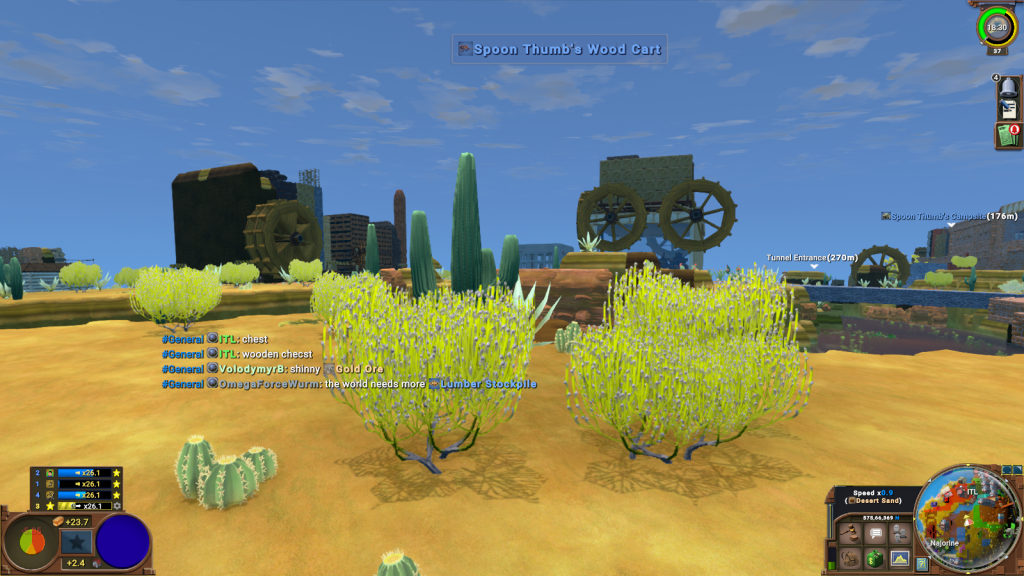
Therefore everyone prioritized getting as nice a home as quickly as possible. As well, being the start of the game, before anyone had levelled up, no one was yet able to produce the advanced items, such as walking boots or wooden carts, that let people carry more items and walk around the world faster. This lead to people in the initial days to just cut down the nearest trees and mine the nearest patch of rock they could find.
The result was a landscape degenerating into a free for all grab-what-you-can disaster zone.
Min-Maxing
It occurred to me that Eco was not at all what I thought. Far from being the preserve of well meaning virtual hippies, it was in fact a game all about “min-maxing”.
Min-maxing is the idea of maximising a certain number in a game, such as a player’s armour or attack damage and concentrating on just increasing that one number, while minimising everything that takes away from that or is unnecessary.
For a game like Eco, this translates into finding the quickest and most efficient way to do everything in the game. A really fancy house might level the player up the fastest. But rather than mine the stone to build that house, it might be faster to mine some specific high-value ore. Sell that, and then buy bricks for the house from someone else who just makes bricks super-efficiently and does nothing else.
The result is hyper-specialisation and rapid progress, but also some very strange outcomes. For example, everyone in the game builds flat roofs on their buildings because pitched roofs require more building material. As well, players can place stockpiles of timber or food stuff or mined rocks on the flat surface, thus maximising the use of limited space. Meanwhile, there is no rain or weather system in the game, so it doesn’t matter for the building underneath if the roof is pitched or flat. Equally, a lack of weather system means, for the stuff piled on top, the food won’t rot and the timber won’t degrade just for being outside.
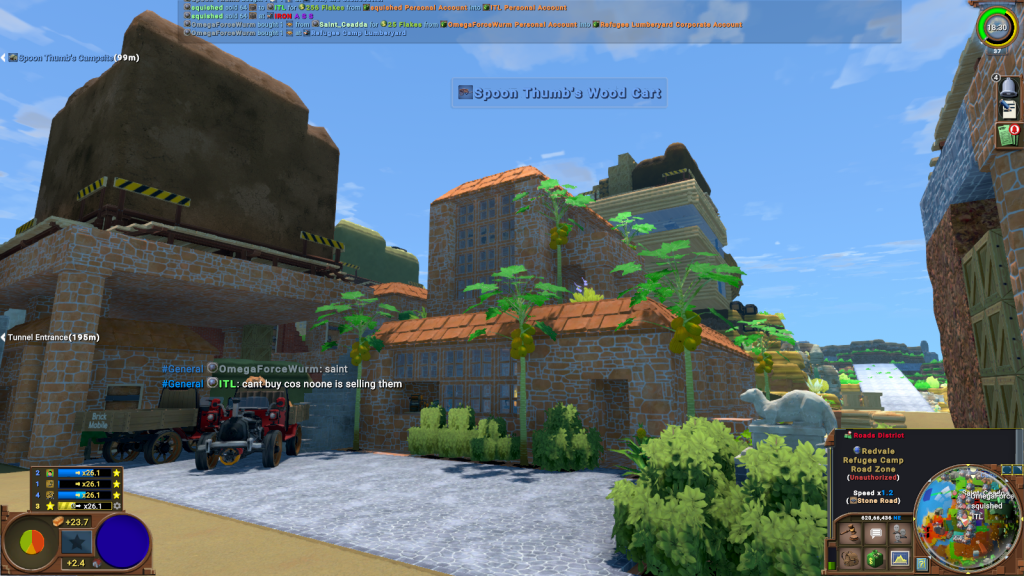
Claiming the Jungle
Aghast at the thought of the game ironically becoming the dystopian antithesis of everything environmentally-friendly, I decided my role in this world would be that of eco-warrior.
A large area of jungle to the north of where I’d built my defunct library was being eaten away by the constant stream of new players joining the server. Their voracious appetite for timber was fed by the underlying design of the game: Everything it seemed required wood in some form or another, from making and repairing the tools that were needed to do just about anything in game. To building the workbenches that were used by the tailors to craft their clothes, or the masons to craft the decorative statues that would adorn everyone’s homes (and boost their levelling up).
So I set about buying up the jungle. Unlike in the real world, buying a patch of land in Eco physically prevents other players from cutting down the trees or harvesting the fruits growing there.
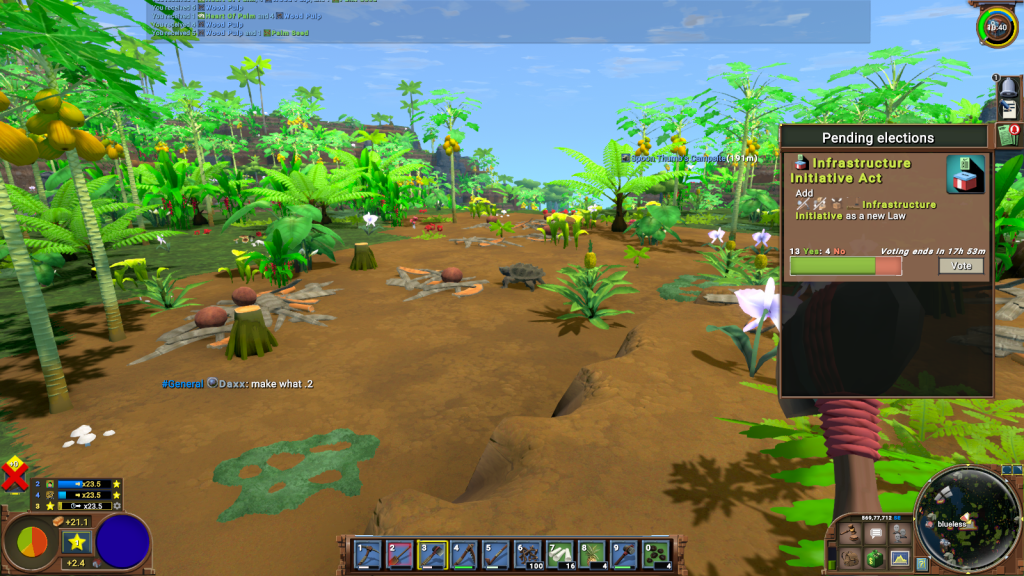
I spent all the money I earned on buying as many “Land Claim Papers” as I could from other players willing to sell. I would then use them to snap up the small lots of land on which were growing the impressively tall, wide canopy “Ceiba” trees. Thus preventing them and surrounding jungle from being cut down.
Simultaneously, in the unclaimed, owner-less jungle areas nearby, I made it my mission to clear any debris (branches and foliage from felled trees) left by other players logging activity. I would always remove any old tree stumps I found. And I would plant a new tree of the same type in the exact same spot when I was able.
The trees grew back – a mere 3 days for a virtual palm tree to grow to full height. And fewer people set up base in the jungle, owing to its inconveniently long distance from the main “town” area where most other players had congregated.
The scale of the destruction lessened, and each evening after work I was able to earn a few more blocks of land to add to my makeshift “nature reserve”.
Mole Man
Then one day I logged in to see a “Transport Infrastructure District” law had been passed in-game. And checking the map, the newly created district cut straight through the middle of the jungle. The other players had voted to build a road through my nature reserve!
I was vaguely aware that there existed a legal system, in which players could vote on laws to be applied to the game’s existing rules. But this particular one went completely counter to all my jungle-protecting.
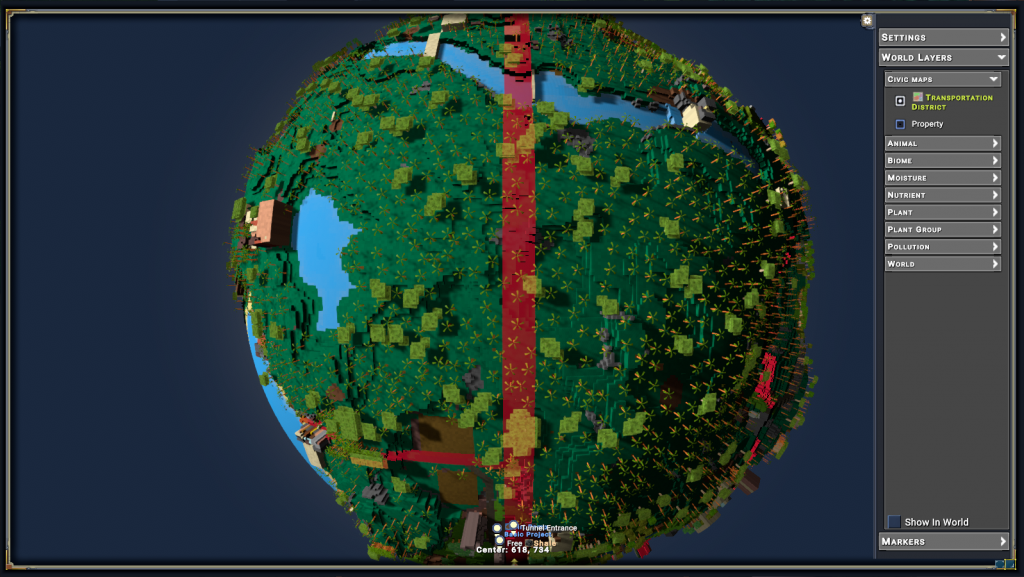
Just as my land claims physically prevented any other player from cutting down my trees or mining under them. So this law did the opposite. Allowing anyone to mine or clear a path in the name of road building.
My initial response was to make a counter-proposal. I would suggest a different route for the road-to-be, going round the edge of the jungle (or at least the bits of it I had bought up).
However, I didn’t really understand what I was doing with the in-game legal system. My proposal was voted down, and one person even thought the jungle bypass route was supposed to be the land for the nature reserve I kept talking about. (I also had a Vogon Bureaucracy moment when I discovered that the office where laws could be proposed was in a building owned by a player who had subsequently quit the game. And they’d left the doors to the building locked. Fortunately they had given door access permission to one of their friends, who eventually let me in).
With the legal path blocked, I had only two options left. I could be a disruptive asshole and try any way I could to stop the road building. Instead though, I chose to build the proposed road myself. Only it wouldn’t be through the jungle, it would go underneath it.
I would build a tunnel along the same route the road proposed, but going underground. Thereby protecting the lush rainforest above. I had some doubts about if this would even work. Maybe people would just ignore my tunnel and build the road overground instead? Or might it even encourage more people to try and exploit the jungle?
Regardless, each day I logged in, the road from town got closer and closer to the jungle, as other players implemented the grand design laid out in the Transport Law. I frantically started digging, shifting huge volumes of stone blocks as I slowly chiseled my way through the “shale” bedrock below the jungle.
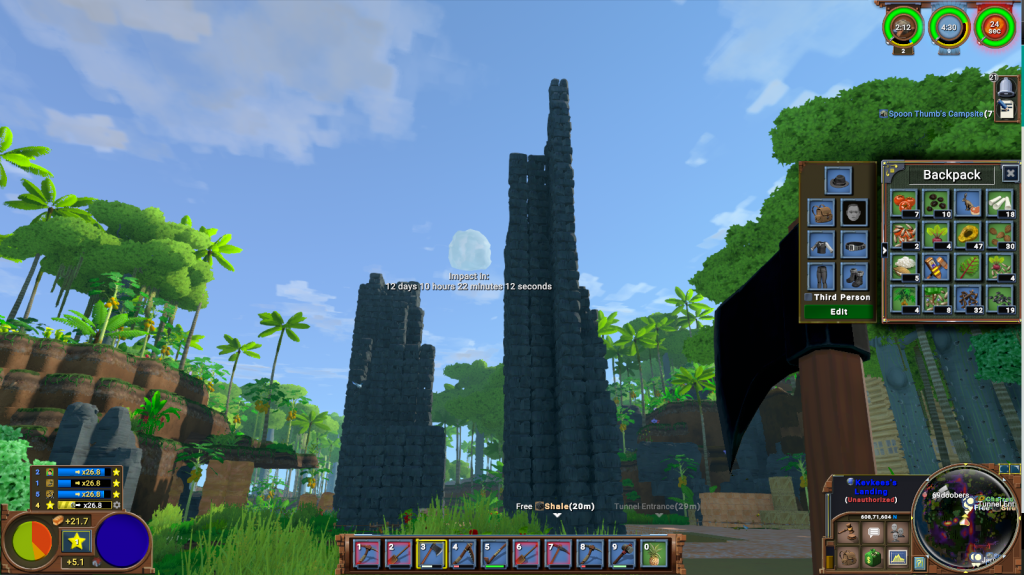
I tried selling the shale, in the hope brick builders might use it and give me some money in return, to spend on further expanding my nature reserve. When that failed, I stacked the shale near the tunnel entrance and erected a “Free” sign next to it. This worked for the first couple of days. But after that, the chunks of shale kept getting stacked higher and higher as I hacked my way through the earth. I just couldn’t get rid of it all. The consequences of saving the jungle, it seemed, were massive heaps of unsightly unwanted slag in a different part of the world.
White Tiger
By the sixth day of playing, the number of other players talking in chat or wandering round the world started to drop off. People began to mention “WT” and what they were going to do there.
“What is WT?” I asked? Turns out it stood for “White Tiger”. The name of another official server. One with even less rules, and even slower levelling up than the one I was on. This was the server all the hardcore min-maxer players wanted to be on. All the veterans who had been through many cycles of meteorites threatening the planet were now discussing what groups they’d form and who would do what when this White Tiger server reset back to a new world and day 1.
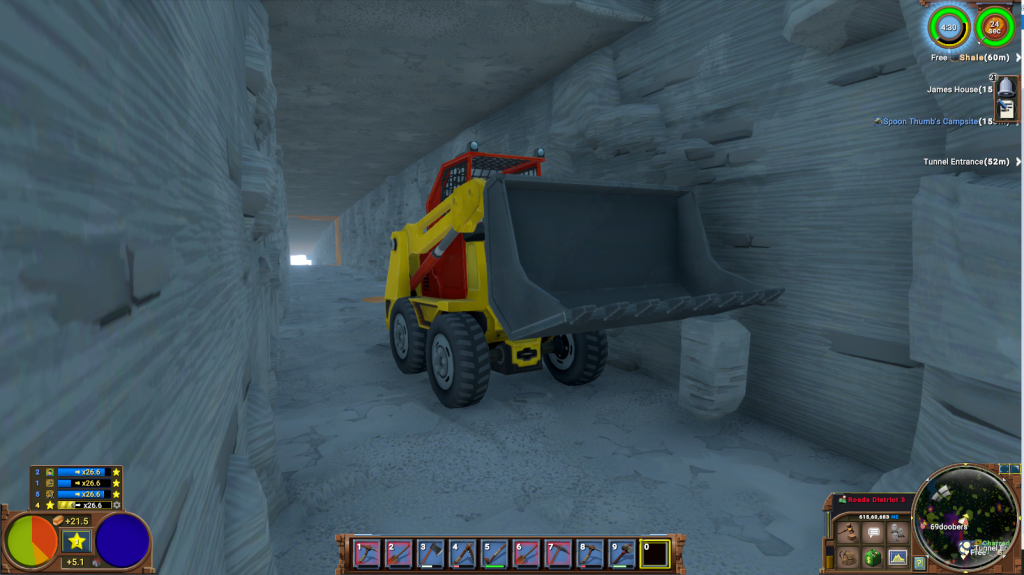
Sure enough, come the following day, the world I was in virtually emptied. Most of the players left for the new world. The shops slowly ran out of stuff to sell without being replenished. The road didn’t quite make it as far as my tunnel, which I rapidly finished thanks to the kindness of another player lending me his mechanised digger vehicle. He wasn’t going to need it anymore.
With everyone playing on White Tiger, my now complete tunnel had become a white elephant. Anyone who might have used it had literally left for Planet B.
End of the World
At time of writing, there are another 11 days before the meteor strikes. The jungle will be destroyed and all my efforts will have been in vain. Or perhaps people will come back and build the giant lasers to destroy the meteor. In either case, whatever happens, the server will reset after the 11 days are up and the jungle, my epic tunnel, and everything else will be erased forever.
I’ve realised, what really saved the jungle from being cut down, and simultaneously doomed it to a fiery meteor impact, was the ability of us humans to imagine a different world. The other players were busy dreaming of what they would do on the new world, even as the end of the old world, in to which they’d poured so much effort already, ticked closer. Even my jungle-saving was about trying to create a different world – one in which the rules were different and people’s actions were less destructive.
It’s what makes games like Minecraft, Civilization, Sim City and in this case, Eco, so powerful. They allow us to make real those imagined worlds. They give us the tools to shape the environment around us as we dream it. I think it’s also why we spend so much energy in the real world building our cities, roads and farms.
Starting Afresh
That’s not quite the whole story though. For all those players that left, the allure of a fresh virgin world, a blank canvas, was a far stronger pull than the thought of trying to improve and save the existing world. A chance to avoid the mistakes of the past, and learn by doing things differently this time. It’s something I find with my own game-playing. When I start up Civilization or Sim City, I will always start a new game. Even if I just spent the whole of the previous day building my city or empire, the bright dawn of a new day, and a new city to go with it, is far more exciting.
For sure it’s not how everyone behaves, but it’s clearly build-in to human nature at a deeper level. Someone has to want to expand their farm to the next valley. To sail their boat to the island on the horizon. Or these days, to build their space rocket to reach the neighbouring planet. We wouldn’t be where we are today without some people having this urge to expand, this pioneering spirit.
Where does that leave us though? Does saving the rainforest need a re-brand, to make it new and exciting again? Do we incentivise those min-maxers to make coral reefs, as measured in km2 their one statistic to boost beyond all others? Is removing carbon from the air the dull, grinding task, like my tunneling, that people do only because they know they’ll get that dream home / better world as a reward?
If I were to sum it up into a neat slogan, it might be: Nudge, Motivate and Act – of course the hard part is still doing those things in the real world. A daunting task considering how damn hard it was to even do in the virtual world.